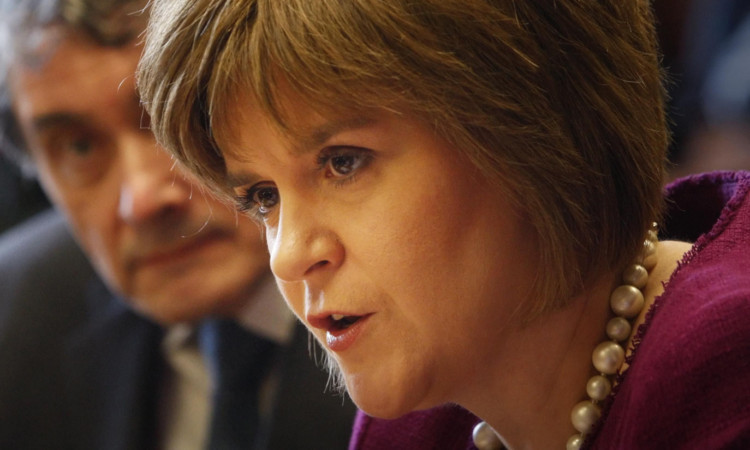
An independent Scotland could abandon plans to increase the state retirement age in a move which would cost up to £6 billion.
Nicola Sturgeon will tomorrow unveil the long-awaited Scottish Government paper on pensions with the lure of another giveaway on state pensions in the event of a Yes vote.
The Deputy First Minister said she is “concerned about Westminster’s accelerated timetable” for increasing the state pension age to 67 by 2026 and will call an expert panel to review the plan.
But the move was last night branded “costly and risky” with the Department for Work and Pensions (DWP) pointing out that not increasing the state pension age to 67 as planned in 2026 will cost £6bn over the following decade.
This is because by 2036 the country is projected to have more pensioners but fewer people of working age to pay taxes to fund the state pension.
The increased costs would kick in at a point when the UK Government claims North Sea tax revenues are set to start declining.
Labour’s pension spokesman Gregg McClymont said: “Leaving the United Kingdom would be costly and risky for pensions.
“Barely a day now goes by without the nationalists making promises without any plan to pay for them, but this latest suggestion on state pensions would cost Scotland £6 billion.”
“They also lack credibility on private pensions with the biggest new workplace scheme warning that independence is a high risk to pensions.
“This is a devastating double blow to Alex Salmond and should make anyone planning for retirement think twice about the risks of independence.”
Under current UK plans, the state retirement age will begin to increase to 66 for both men and women from 2018 and to 67 from 2026.
The Scottish Government will argue in its pension paper this is unfair for Scotland as life expectancy is lower north of the Border.
This year, life expectancy at birth in Scotland was 1.8 years lower for females and 2.5 years lower for males, meaning the average number of years spent in receipt of the state pension is lower in Scotland than the UK average. Sturgeon said: “We are concerned about Westminster’s accelerated timetable for increasing the state pension age.
“This is now planned to be delivered eight years earlier than previously expected with significant implications for individuals.
“We want to make sure that the pension age suits Scottish circumstances. On average, people in Scotland have fewer years in retirement receiving the state pension than our counterparts in the UK because life expectancy is lower.
“That is an anomaly that needs to be tackled but in the meantime, it is important to ensure that Scots approaching retirement age are not unfairly disadvantaged.”
However, the DWP claims the cost of not increasing the state pension age to 67 in Scotland in 2026 may be £200 million in the first year alone. By 2030 the cost could rise to as much as £800 million with as many as 30,000 fewer people in employment, reducing GDP by over £1 billion per year.
Not increasing the State Pension age to 67 earlier will cost a total of £6bn in extra benefit expenditure in Scotland between 2026/27 and 2035/36, according to the Whitehall department. A previous promise by SNP ministers of a higher state pension in an independent Scotland has been estimated will eventually cost £700 million a year.
In a further blow to the Scottish Government, the main UK-wide auto-enrolment workplace pension scheme has described independence as a “high risk”.
The National Employment Savings Trust (NEST) which has more than 200,000 members who are mainly low or middle-income earners said the referendum presented a risk of 10 (high) on its risk register.
Documents released under freedom of information laws show the Trust has concluded “the forthcoming vote on Scottish Independence has considerable risks for the operation of NEST.
The files, released under the Freedom of Information Act, also show that Scottish Government officials preparing the pension paper asked NEST officials for a copy of a glossary of pension terms to aid their understanding.
SNP ministers have pledged that in the first year of an independent Scotland a commission would be set up to “consider the appropriate pace of further change to the retirement age beyond 66”.
This commission would report to Holyrood by 2018 and a final decision would be taken then.

Enjoy the convenience of having The Sunday Post delivered as a digital ePaper straight to your smartphone, tablet or computer.
Subscribe for only £5.49 a month and enjoy all the benefits of the printed paper as a digital replica.
Subscribe